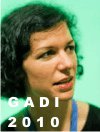Im Rahmen des E-Learning Tag 2010 an der Universität Innsbruck bin ich gebeten worden rund um unsere Erfahrungen und Untersuchungen zum Thema Digital Natives an Universitäten zu berichten. Ich habe den provokativen Titel „RT @twitter ist die Uni auf Facebook? #DigitalUniversity #l3t“ gewählt und der Abstract meines Vortrages lautet:
Die Digital Natives, die Netgeneration, die Generation @ oder wie man sie auch immer bezeichnen möchte stehen am Übertritt zur Hochschule. Oder ist dies nur ein Mythos einer von technologischen Neuerungen geprägten Zeit? Dieser Vortrag beleuchtet das Thema einer möglicherweise völlig digitalisierten Jugend anhand von Daten, die auf Umfragen aus den letzten drei Jahren basieren. Aufgrund dieser Befragungen an der Technischen Universität Graz kann ein Bild der heute Erstemstrigen gezeichnet werden, welches sowohl infrastrukturelle, organisatorische als auch didaktische Entscheidungen beeinflusst.
Freu mich auf spannenede Diskussion am 22. Juni in Innsbruck.


